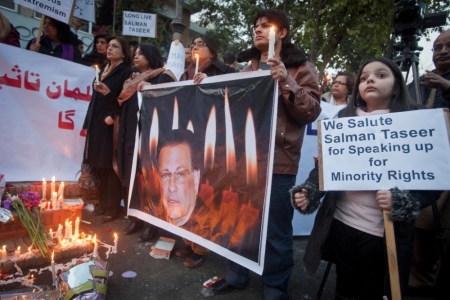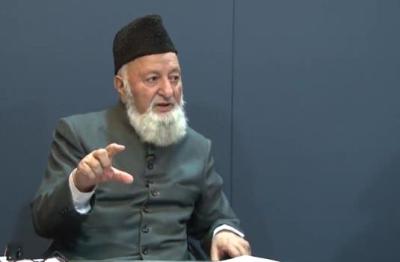Islamic Clerics Fight to Keep Pakistan's Blasphemy Laws That Persecute Christians: 'Those Who Insult Muhammad Deserve to Be Killed'

As Pakistani lawmakers consider legislation to reform the nation's corrupt blasphemy laws, Islamic clerics are bashing the government for even considering such an option, and are calling for the release of the murderer of the Punjab governor who advocated for blasphemy reform in 2011.
Asia News reports that 10 Muslim scholars and a former Pakistani judge gathered recently at a "seminar for protection of the prophet's dignity" and expressed their concern over the proposed legislation that is attempting to add the word "intention" to the nation's blasphemy law.
Speaking at the seminar was former Pakistani justice Mian Nazir Akhtar, who represents Mumtaz Qadri, the bodyguard who killed Punjab Governor Salman Taseer for referring to Pakistan's blasphemy law as a "black law." Akhtar bashed the proposed legislation and asserted that those who insult the Muslim prophet Muhammad deserve to be killed and "sent to hell."
"The new bill rejects all sayings by the 'holy prophet,'" Akhtar stated. "When it comes to the sanctity of the prophet, the implementation of all man-made laws become different. Those who insult him have no rights, including no right to live. There is no need for trial or hearings."
Pakistan's blasphemy law is often used by Muslims, who consist of over 96 percent of the population, to attack Christians and other religious minorities whom they have a personal issue with.

In many circumstances, religious minorities are accused of blasphemy and are either sentenced to imprisonment, death or are beaten, burned and or killed by angry Muslim mobs who use the law to try and justify their malicious actions.
As one prime example, a Christian mother of five, Asia Bibi, was sentenced to death by a Pakistani court in 2010 after being accused of blasphemy by a group of Muslim women who were furious that she drank from the same water supply that they did.
In November, an angry Muslim Mob attacked and burned alive a Christian couple accused of desecrating pages of a Quran by holding their beaten bodies over a brick furnace.
Over 40 Pakistanis are sitting on death row or have been sentenced to life in prison because of blasphemy accusations.
Other Islamic leaders at the seminar warned against messing with the blasphemy law and threatened protests, sit-ins and "fatwas against supporters of the proposed bill."
In a op-ed posted to NationalInterest.org earlier this month, Katrina Lantos Swett, the chair of the U.S. Commission on International Religious Freedom, pointed out the injustice in the fact that in a nation with a less-than 4 percent religious minority community, it's religious minorities that seem to "bear the brunt" of the blasphemy law.
"The blasphemy law on its face flatly violates both freedom of religion and freedom of expression. Worse still, Pakistan vigorously applies this law," Swett wrote. "Moreover, the weight of this law falls disproportionately on members of religious minority communities, such as Christians, Hindus, Sikhs, and Ahmadis.
"In addition, enforcement of such laws emboldens religious extremist groups and their sympathizers to assault these minorities — as seen most recently when terrorists slaughtered Ismaili Muslims on a bus," she continued. "And finally, Pakistan's zealous enforcement of these laws is in contrast to the pronounced lack of zeal bringing to justice those responsible for such attacks."
Saeeda Deep, from the Institute of Peace and Secular Studies, told Asia News that her organization has campaigned for a reform to the blasphemy law for years, but the organization's arguments have come to no avail.
"We tried to prove blasphemy by producing four Muslim witnesses, but our voices are being suppressed," Deep said. "Even Saudi Arabia, our religious hub, does not follow such strict version of this law."
As for Qadri, a Pakistani court upheld his death sentence in March for killing Taseer. But the Islamic clerics believe he is now "immortal" and should be freed for killing a governor who advocated for Bibi's release and carried a "western agenda."
"This single act [Taseer's murder] made Qadri immortal," Akhtar claimed. "Taseer's authority could not save him. He had lowered himself and violated his oath for a woman who was proven guilty by the court and then punished. He carried a western agenda for more than three years and was finally sent to hell."
Deep pointed out the hypocrisy of the Islamic clerics wanting to uphold death sentences of innocent religious minorities falsely accused of blasphemy, while wanting to free Qadri, who has issued no remorse for his cold-blooded murder.
"If the clerics believe in killing in the name of God, they must accept death sentence of governor's guard for the same cause," she said.





















